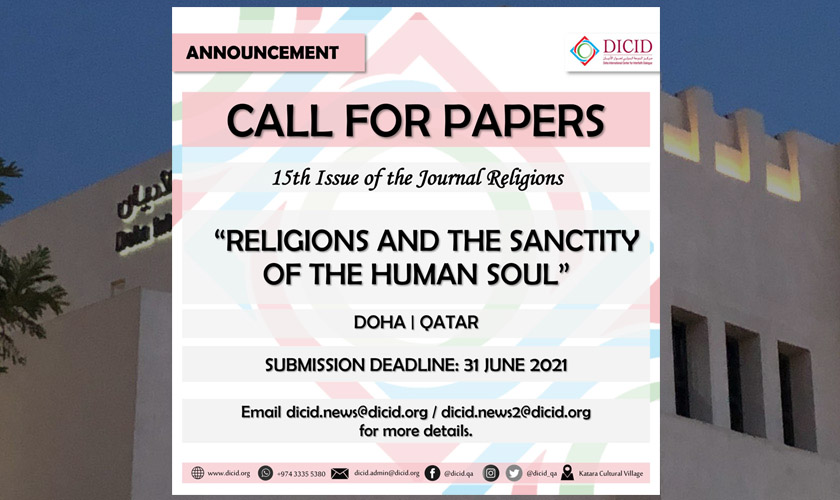
26 Mar Call for Papers 15th issue – Religions “Religions and the Sanctity of the Human Soul”
The world today is experiencing a real crisis steeped in the emergence of violence in all its forms. This often leads to crimes that claim the lives of many innocent people in conflicts that are entirely unjustified. It is unfortunate that these reprehensible acts and behaviors are justified – in many cases – by using religious fanaticism, radicalism and ignorance; whilst religion remains falsely tarnished. There is no doubt that the laws of the heavenly religions affirm a man’s honour as ordained by God Almighty, and has made man inviolable giving him – as a human being – the right to a safe life free from intimidation, violence, aggression and assault. Furthermore, many religious teachings uphold that there is no sin and crime greater than the unlawful assault, end or terror of the human soul. Allah, may He be glorified and exalted, alone is the Grantor of life and He alone can take it away. The right to life belongs totally and ultimately to God Almighty.
Islamic Sharia affirms this by the prohibition of unlawful killing, and protects the right to a decent life of a person, whether Muslim or non-Muslim. God says, “And do not kill anyone which Allah has forbidden, except for a just cause.” (Quran, 17:33). The Almighty also says: “if anyone killed a person not in retaliation of murder, or (and) to spread mischief in the land – it would be as if he killed all mankind, and if anyone saved a life, it would be as if he saved the life of all mankind.” (Quran, 5: 32)
In Christianity, the words of Christ, peace be upon him, had come as an affirmation of the divine laws concerning killing, as well as specifically to limit it. In Matthew 21:5, it says, “You have heard that it was said to the ancients: You shall not kill, and whoever kills shall be subject to judgment.”, and this is an allusion to what came in the Torah in Exodus (20-13): “You shall not kill.”
Even positivist philosophies are clearly directed to the prohibition of killing oneself and of others. The first section of the five Buddhist traditions on which Buddhists swear by states: “I pledge to abide by the law of training to refrain from taking life (killing).” Likewise, Confucius, the great Chinese philosopher, built his philosophy on opposing unlawful killing. His philosophical ideas called for “morality, compassion, and loyalty.”
From this standpoint, the Religions journal, published by the Doha International Center for Interfaith Dialogue, chooses to present the topic, “Religions and the sanctity of the human soul” for its next issue (no:15). The following issues are to be investigated: the right to life and the prohibition of killing the human soul in religions, the crime of killing oneself and war crimes and their impact on the security and stability of societies, the position of religions on the rights of vulnerable minorities and civilians during armed conflicts and wars, extremism and terrorism, means of confrontation, psychological and religious treatment suicide, abortion, euthanasia, and the position of the divine religions on them.
The journal invites distinguished writers to contribute their academic research in dealing with these important topics from its many aspects.
Research contributions can be made according to the following conditions:
– Submit research papers in either Arabic or English.
– The submitted research papers should be between (10 to 15 pages) (3000 – 5000 words), and research papers that exceed or fall below this limit will not be accepted.
– Research papers must be submitted in Microsoft Word format, in the traditional Arabic font, font size (16) and Times New Roman font for English with a (14) point font size.
– The journal publishes book reviews and translations; the limit for reviews shall not be less than (5 pages), and for translations (10 pages).
– It is expected that the researcher take into account the conditions of writing scientific papers, and that the research be supplemented with sources, bibliography and references.
– Note that the bibliography of the research and its sources are written at the end of the research.
– A brief biography of the researcher (no more than five lines), and a recent personal photo should be attached.
– Only the authors of the selected research will be notified.
– The journal grants a financial reward for research and published materials estimated by the editorial board.
– Deadline: June 31, 2021.
– Research papers should be sent to the following e-mail:
dicid.news@teds.host
dicid.news2@teds.host



Sorry, the comment form is closed at this time.